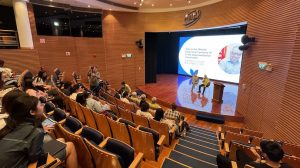IFTM offers bachelor’s degree programmes in various fields related to tourism studies, including hospitality, the culinary arts, retailing, and cultural heritage matters. While each programme provides students with tailor-made content in its respective area of expertise, there are courses that are common to all programmes, and that aim to give undergraduates access to essential skills that any future professional will need to achieve career success. One of those courses is on Entrepreneurship, led by Assistant Professor Dr. Fernando Lourenço, a specialist in the field.
The course was first offered in 2014. It aims to equip students with an enterprising outlook that they can utilise to generate career opportunities.
“The course tends to use practical, hands-on, and fun approaches to teach and motivate students,” says Dr. Lourenço. It covers “a range of topics to inspire and empower students to think about entrepreneurship, and engage them to try things out,” he says.
The Institute’s focus on entrepreneurship aims to contribute to Macao’s goal of economic diversification. It complements the Macao SAR Government’s efforts regarding development of business-formation skills among the city’s young people.
At IFTM, Dr. Lourenço says he was given the freedom and resources to “develop, pilot and execute a range of ideas” related to entrepreneurship education. According to him, the teaching toolkit used at the Institute “is very different” from the traditional way entrepreneurship is approached at many educational institutions, where often “the aim is only the provision of information and knowledge via lecture-based sessions”.
The scholar explains that the “defining factor” of IFTM’s course is the integration in the curriculum of an industrial or consultancy project. Complementary to in-class lectures, undergraduates are required to complete practical projects aimed at giving them real-world experience, and that also contribute to the development of local businesses.
A recent example was the provision by IFTM undergraduates of consulting services to a local association about the use of NFT (non-fungible token) technology to support the development of Macao’s cultural and creative industries. Other projects carried out in academic year 2021/2022 included conducting market research and developing marketing plans for a local jewellery brand and a new pastry-making business.
Such projects are a means to provide “local entrepreneurs, small- and medium-sized enterprises, and other organisations free consultancy services including research, development, generation of new ideas, pilot testing, strategic development, business model development, and business planning, etcetera,” says Dr. Lourenço. Since the start of the course on Entrepreneurship, more than 40 ‘clients’ have received support from IFTM students.
This approach aims to generate “5 wins” for the various stakeholders, explains Dr. Lourenço. “First, the project provides real-world experience for students, and this can improve the content of their curriculum vitae,” he says. Second, “the project generates valuable outcomes for the ‘clients’”.
When students and ‘clients’ gain, the quality of the teaching and of the programmes at IFTM improves – that is a third win, states Dr. Lourenço. “This will boost the overall quality of the Institute,” a fourth win, he says, as well as generating “positive impact” for the Macao SAR – the “fifth win”.
The course on Entrepreneurship also makes use of guest speakers. Since the launch of the course, around 70 have delivered talks to students, sharing insight on issues related to entrepreneurship and Macao’s business environment.
The guest speaker scheme is an “important element” of the course, Dr. Lourenço says. “It aims to empower and inspire students regarding entrepreneurship, by allowing them to interact with entrepreneurs, and to learn from their stories and experience.”
Creating value
“Entrepreneurship provides important contributions to stimulate economic and regional development, job creation, innovation, and the development of the tourism industry,” says Dr. Lourenço. It “enhances the standard of living” within a community, via the goods and services it helps create, and it also has positive impacts on community development in general, he adds.
Dr. Lourenço points out that “entrepreneurship education in higher education is important because it expands the perspective of students and graduates”. Although the typical aim of higher education is to produce graduates ready to contribute to the labour market with their specialised skills and knowledge, “there is growing consensus around the world that a role of universities is also to empower students and graduates to see that they can start up and grow their own business,” he says.
According to the scholar, an increasing number of IFTM undergraduates are launching new businesses even before completing their studies. But Dr. Lourenço stresses that an entrepreneurial mindset is not just about creating your own job. It is a “survival skill” that any professional must have in today’s complex society. Such a way of thinking is something that can be valued even within established organisations, where it is sometimes referred to as ‘intrapreneurship’.
The ongoing negative impact of the COVID-19 pandemic on the job market can be an additional trigger for IFTM graduates to use their entrepreneurial skills and create their own means of employment, says Dr. Lourenço. Faced with complex job market conditions, it is “increasingly important” that students and graduates have the knowledge to set up their own company and to develop a business, he states.
The IFTM scholar points out that entrepreneurship is an “interdisciplinary” tool: it can be applied to a wide range of fields to develop new businesses. “Businesses can be created based on any specialism,” Dr. Lourenço highlights, quoting science, engineering, arts, sports, education, and management as some examples.
The scholar highlights that IFTM’s effort to spur entrepreneurial minds in Macao goes beyond the course on Entrepreneurship. The Institute stimulates skill development and motivation via an entrepreneurship competition called “Idea-cation”. It also supports interested students, alumni, and those starting on an entrepreneurial path, via its “Ideation Lab” business incubator, officially launched in January.
In addition, IFTM has an iRetail Lab that provides a physical and online retail platform (available at https://iretail-lab.com) for entrepreneurs to showcase and sell their products. Since its activation last year, the iRetail Lab has been employed as a teaching venue for interactive courses in that field. The venue simulates a retail store, with themed sales areas for products including cosmetics, jewellery, clothing, and travel souvenirs. Local designers and retailing brands work to support the iRetail Lab’s operations, and their products are available for sale there. Currently there are 14 ‘tenant’ businesses and entrepreneurs, notes Dr. Lourenço.









